中考语法状语从句课件
图片预览
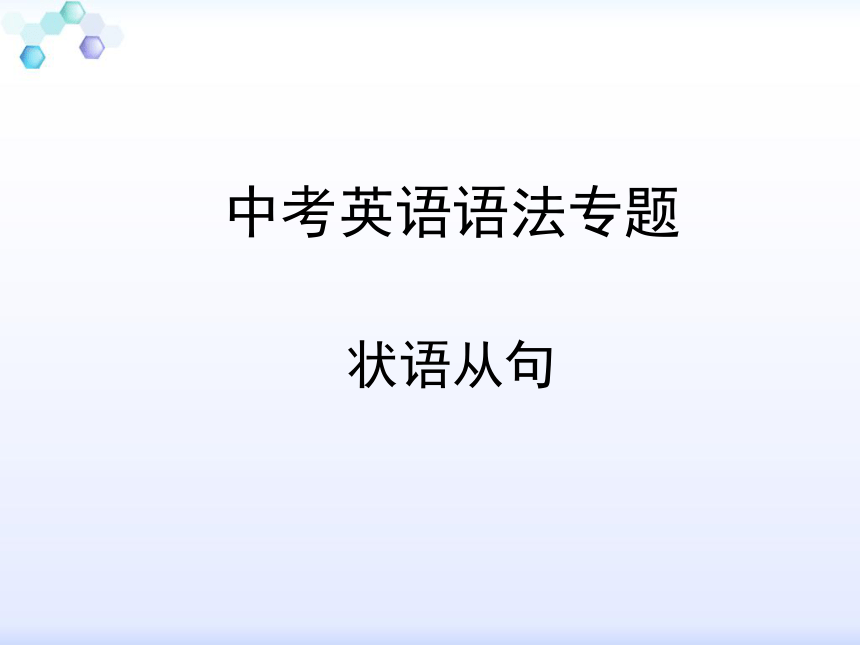

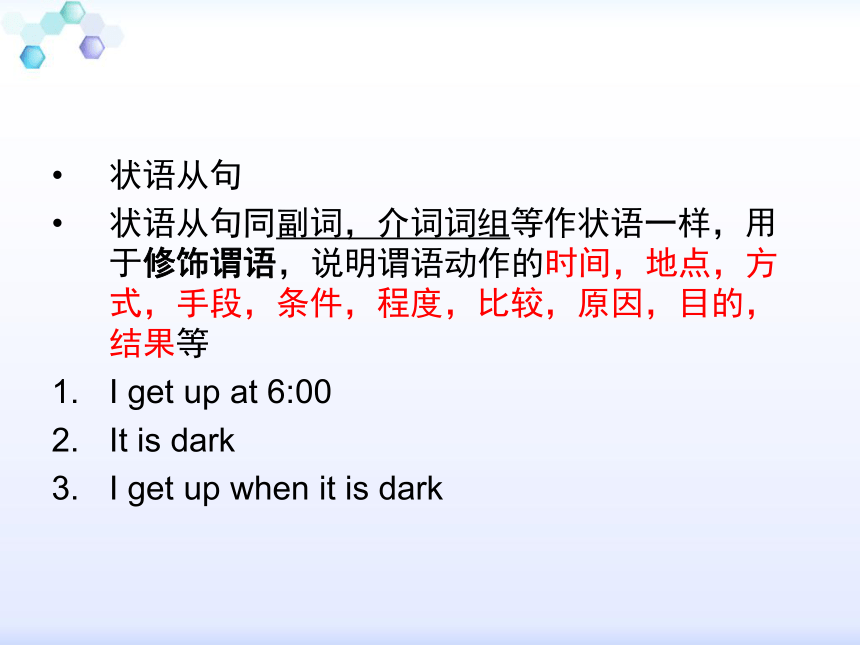
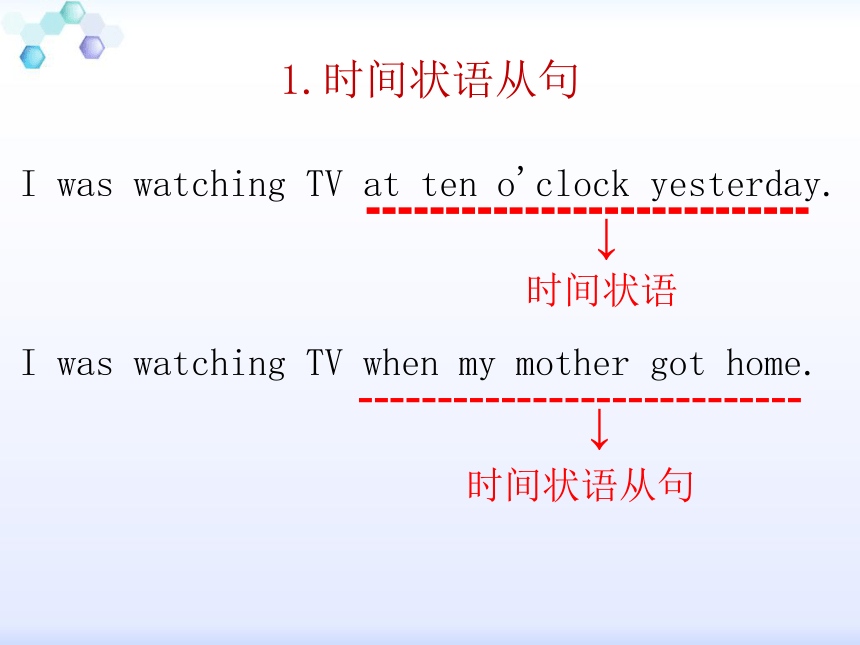
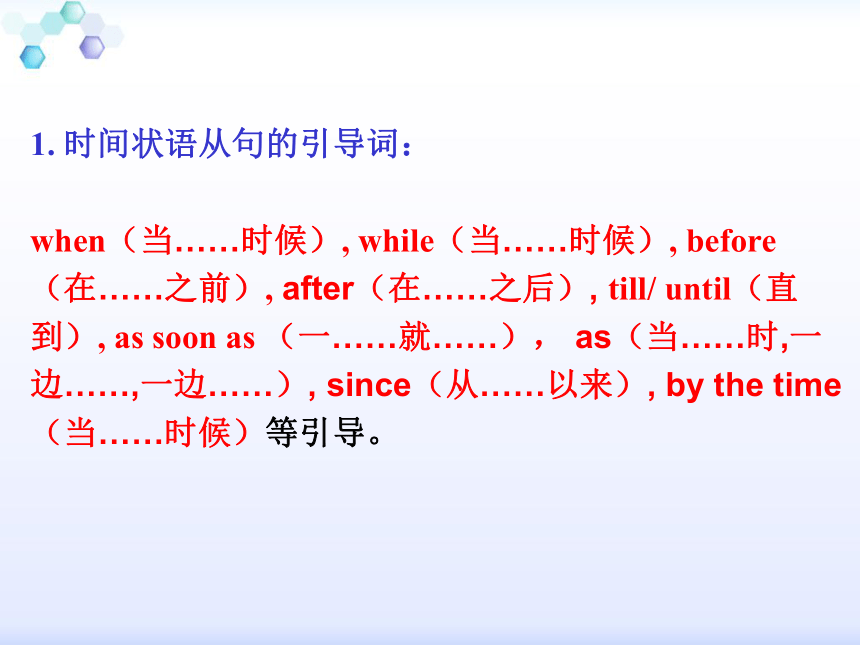
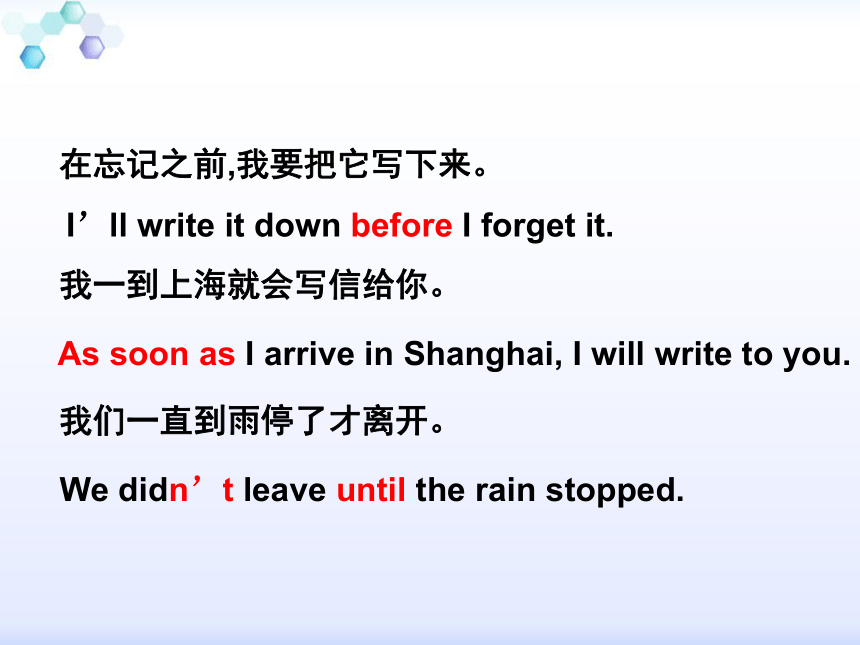
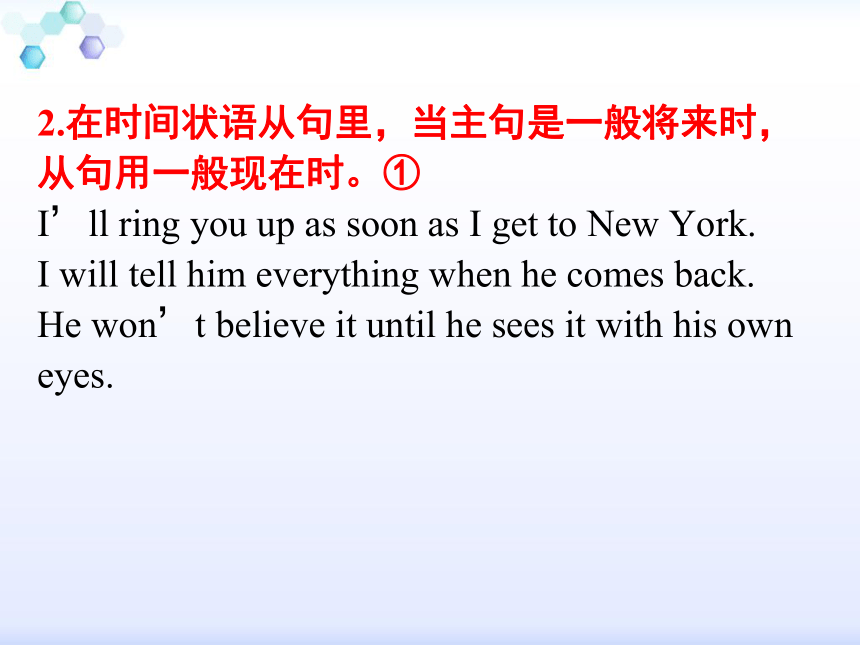
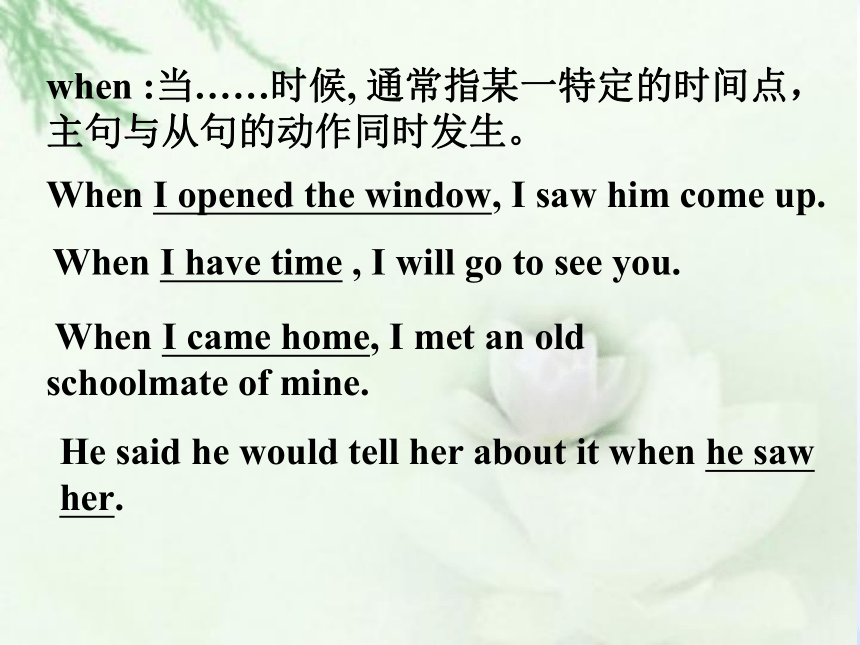
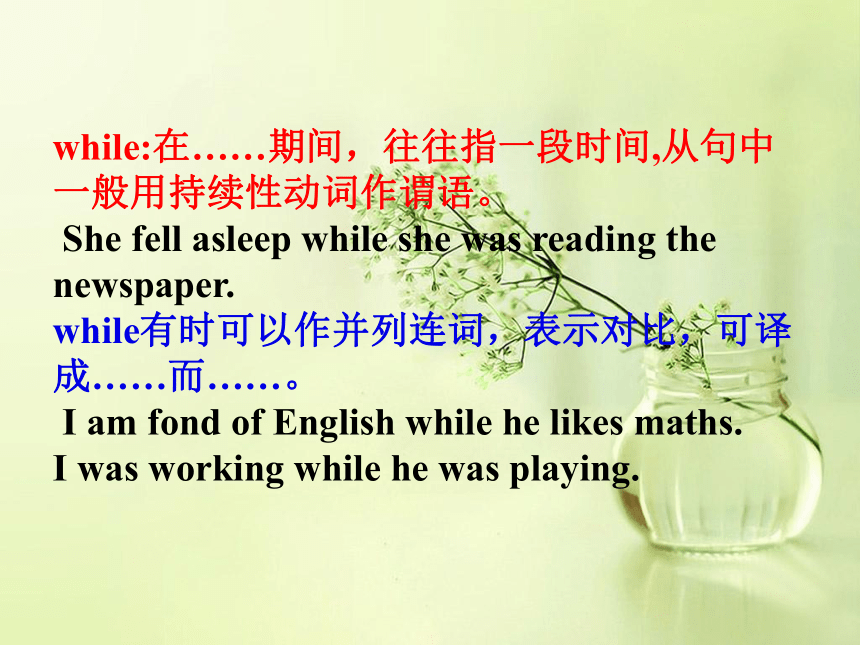
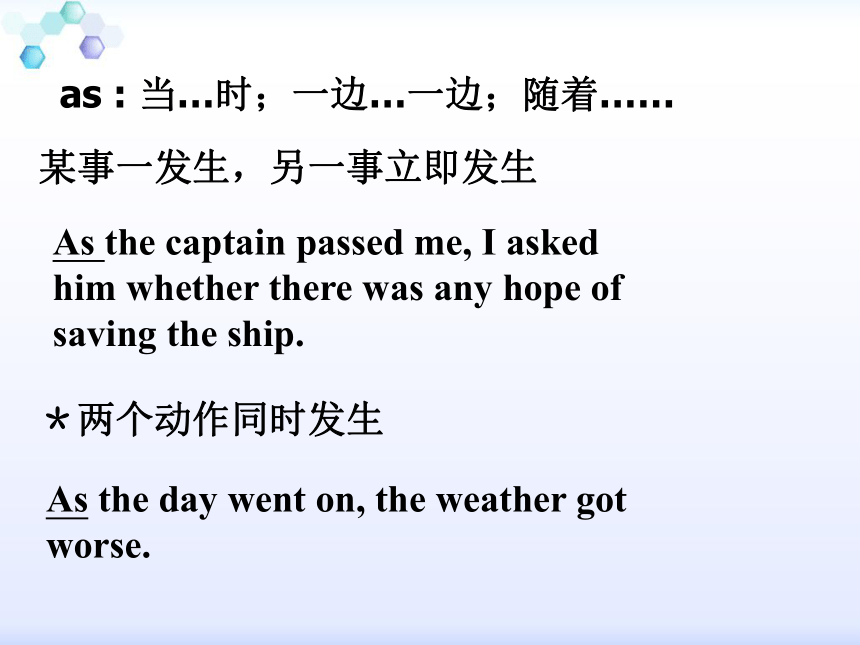
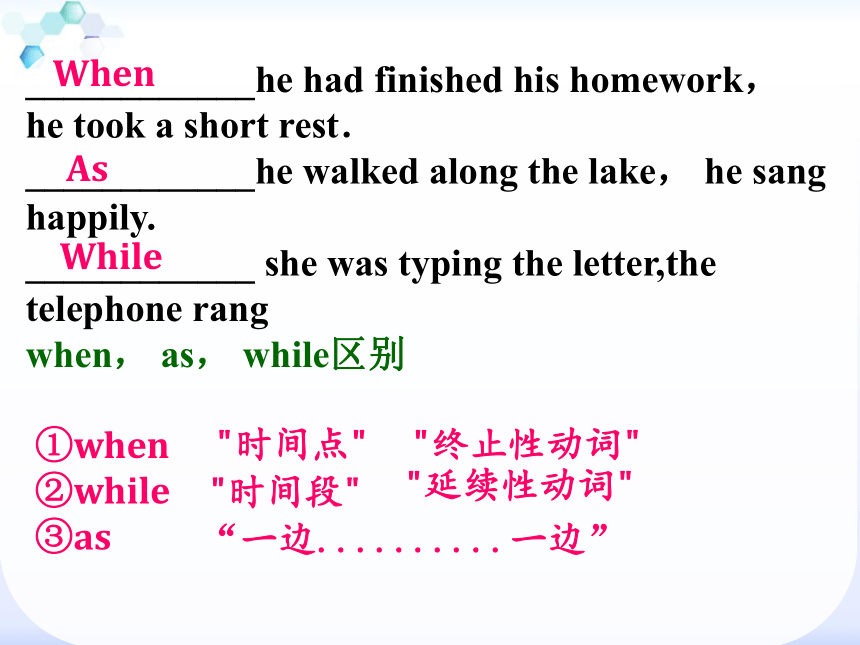
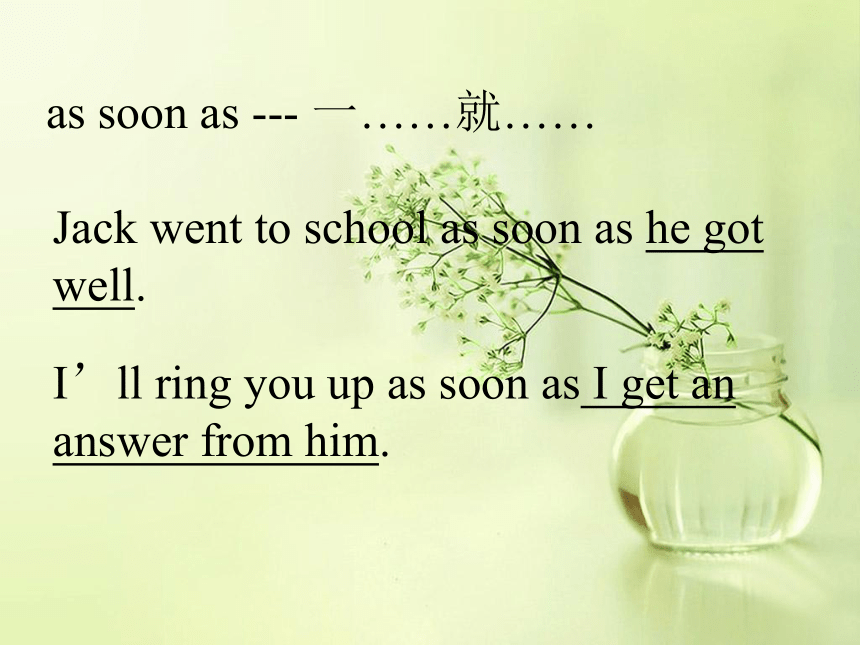
文档简介
课件39张PPT。状语从句中考英语语法专题什么是状语从句?用一个句子充当状语成分,那个句子
就是状语从句。I get upat sixwhen it is dark.I get upat schoolwhere I study.状语从句
状语从句同副词,介词词组等作状语一样,用于修饰谓语,说明谓语动作的时间,地点,方式,手段,条件,程度,比较,原因,目的,结果等
I get up at 6:00
It is dark
I get up when it is dark1.时间状语从句
I was watching TV at ten o'clock yesterday.
I was watching TV when my mother got home.----------------------------↓时间状语----------------------------↓时间状语从句1. 时间状语从句的引导词:
when(当……时候), while(当……时候), before(在……之前), after(在……之后), till/ until(直到), as soon as (一……就……), as(当……时,一边……,一边……), since(从……以来), by the time (当……时候)等引导。
在忘记之前,我要把它写下来。
我一到上海就会写信给你。
我们一直到雨停了才离开。
We didn’t leave until the rain stopped.As soon as I arrive in Shanghai, I will write to you.I’ll write it down before I forget it.2.在时间状语从句里,当主句是一般将来时,
从句用一般现在时。①
I’ll ring you up as soon as I get to New York.
I will tell him everything when he comes back.
He won’t believe it until he sees it with his own
eyes.when :当……时候, 通常指某一特定的时间点,主句与从句的动作同时发生。When I opened the window, I saw him come up.When I have time , I will go to see you. When I came home, I met an old schoolmate of mine. He said he would tell her about it when he saw her.while:在……期间,往往指一段时间,从句中一般用持续性动词作谓语。
She fell asleep while she was reading the newspaper.
while有时可以作并列连词,表示对比,可译成……而……。
I am fond of English while he likes maths.
I was working while he was playing.
as : 当…时;一边…一边;随着……某事一发生,另一事立即发生
*两个动作同时发生As the day went on, the weather got
worse.As the captain passed me, I asked
him whether there was any hope of
saving the ship.____________he?had?finished?his?homework,he?took?a?short?rest.
____________he walked along the lake, he sang happily.
____________ she was typing the letter,the telephone rang
when, as, while区别
①when
②while
③asWhenAsWhile"时间点""延续性动词"“一边..........一边”"时间段""终止性动词"as soon as --- 一……就……Jack went to school as soon as he got well.I’ll ring you up as soon as I get an answer from him. since :自从…, 通常主句用现在完成时I have never been there again since I graduated from the university.It is +时间段+since从句(过去时) ②
It has been +时间段+since从句(过去时)It is five years since we met last time.
It has been ten moths since we graduated.※ before ① 在……前
It will be half a year before I come back.
It won’t be half a year before we meet again.
We sailed four days and nights before we saw the land.②it will be +一段时间+ before...多久之后才...③it won’t be +一段时间+ before...不久就....※till, until和not…until:1.until/till引导时间状语从句用于肯定句时,主句的动词是延续性动词,表示动作或状态一直持续到until/till所表示的时间,意为“某动作一直延续到某时间点才停止”。如:
We waited until he came.
2.用于否定句时,主句谓语动词是非延续性动词,从句为肯定,意为“某动作直到某时间才开始”,如:
He won’t go to bed till/until she returns. 练习 :
1. I’ll write to you _______ I get there. A. while B. before C. as soon as D. by
2. He has lived in the city _________ he came back from America. A. when B. before C. since D. after
3. We won’t leave here _______ our teacher comes back. A. until B. since C. after D. as soon as
4. I had to finish the picture ________ my mother came back. A. until B. before C. after D. while
5. John fell asleep ________ he was listening to the music. A. after B. before C. while D. as soon as
中考题型时间状语从句2. 地点状语从句
地点状语从句由 where, wherever 等引导。例如:
You can take a walk wherever you like to.
---Mom, what did your doctor say?
--- He advised me to live where the air is fresher.
3.条件状语从句
由if(如果), unless(if...not,除非), so/as long as (只要)等引导,谈论的是一个有可能发生的事实及其产生的相关的结果,主句用现在时,从句也用现在时;主句用过去时,从句也用过去的某种时态。
主将从现具体地讲,主句是一般将来时(包括祈使句和含有情态动词can, may, must等),从句也用一般现在时。
①
We won’t wait for him, if he doesn’t come before 12o’clock.
We won’t wait for him, unless he comes before 12o’clock.
So long as you keep on trying, you will surely succeed.
“祈使句 + and (or)+ 结果句” ③
= 条件状语从句
Hurry up, or you'll be late.
=If you don't hurry up,you'll be late.
Study hard and you will pass the exam.
=If you study hard, you will pass the exam.
You’ll be late ______ you don’t get up early tomorrow morning. A. if B. when C. before D. until
If he ______ on time, we will go without him A. doesn’t come B. don’t come C. didn’t come
If you _______ him tomorrow, please ask him if he ______ to work on the farm with us. A. see ; goes B. will see; goes C. will see; will go D. see; will go中考题型总结: 条件状语从句考的频率比较高,主要考查if 连词和if引导的从句与主句的时态(主将从现)条件状语从句如果是否 4.原因状语从句
原因状语从句通常由because, as, since, 等词引导。
because语气较强,用以回答why问句。④
-Why are you late again today?
-Because I've got a bad cold.
as语气较弱,较口语化,所表示的原因较明显。
As I didn’t know the way, I asked a policeman.
since语气较弱,常表对方已知的事实,相当于汉语的“既然”。
Since you can't answer the question, you might ask someone else for help.because和so不能同用在一个句子里 ⑤, 如:
我们不能说:
Because it rained hard, so we stayed at home.
应该说:
或It rained hard, so we stayed at home.
Because it rained hard, we stayed at home.
because of和because的区别⑥
① because of后加名词代词或动名词,不加句子,而because加句子,例:
Because of his illness, he didn’t go to work.
Because he was ill, he didn’t go to work. 1. I didn’t buy the dictionary yesterday ______ my aunt would give me one. A. until B. because C. if D before
2. ---- Why did you come to school late this morning?
----- ______ I watched the football World Cup until 12 o’clock last night. A. If B. Because C. Since D. Though 中考题型√√总结: 重点掌握because 的用法 (注: because 和so 不能同时用在一个句子中)原因状语从句5.结果状语从句
结果状语从句常用so that, such that等关联词引导。e.g.
He is so young that he can’t go to work.
He got so little pay that his family had to live on welfare money.
It’s such a good chance that we mustn’t miss it. 他如此小以致于他不能上班。他工资很少,他的家人不得不靠救济金生活。(welfare money)机会这样好,我们决不能失掉。so…that …和 such…that… ⑦ such…that “如此的…以致于”表结果。该结构常见于: 1.such+a(an)+形+名词+that 2.such+形+复数名词/不可数名词+that
so…that “如此的…以致于”表结果。该结构常见于: 1.so+形/副+that 2.so+形+a(an)+单数名词+that 3.so+many/much/few/little+复数名词(不可数名词)+that It was such a wonderful film that all of us wanted to see it again. =
The film was so wonderful that all of us wanted to see it again.It is such an important match that nobody wants to miss it.
=The match is so important that nobody wants to miss it.
He had such long arms that he could almost touch the ceiling.
Soon there were so many deer that they ate up all the wild roses.
He has so little time that he can’t go to the cinema with you.
记:注:名词前由many, much, little, few等词修饰时,用so,不用suchso……that句型的否定形式可用简单句
too……to或not……enough to代替⑧。如:
He is so young that he can't go to school.
=He is too young to go to school.
=He is not old enough to go to school
6.目的状语从句(1).引导目的状语从句的词组有so that, in order that等,谓语中常含有may, might, can, could, will, would等情态动词。如:
He must get up early so that he can catch the first bus.
(2).当从句主语与主句主语一致时,可用so as to,in order to。⑨ 如:
He worked day and night in order that he could succeed.
=He worked day and night in order to succeed.7. 让步状语从句
让步状语从句,表示“虽然,尽管,即使”等概念,
常用的关联词有:though, although, even though/ if 等。
Though he was ill, he was still working.
他虽然有病,但仍然继续工作。
Although it is difficult, we shall do it.
此事虽难,但我们还是要做。
Even though you say so, I do not believe it.
即使你这样说,我也不信。 ①though和although可以互换,只是although比较正式。
②though/ although不可以与连词but连用,但可以与yet,still连用。⑩例:
Though it was raining hard, but he still went out.
Though it was raining hard, he still went out.
It was raining hard, but he still went out . 8. 比较状语从句比较状语从句常用than或as…as,the more… the more
等引导。than表示两者的比较,as…as表示程度相同的
比较;The more…the more…表示” 越…越…”。例:
That book is more interesting than this one.
那本书比这本有趣。
He runs as fast as I (do).
他和我跑得一样快。
The more I see him , the less I like him.
我越看他就越不喜欢。1. He doesn’t work so hard ___you do.
2.The more you worry, _______you’ll succeed.
3.She did worse in the test ________she expected.asthe lessthan练一练9. 方式状语从句
方式状语从句由 as, as if , as though 等引导。例如:
You can do it as what I just did.
I couldn’t moved my legs. It was as if they were stuck to the floor.
He sounds as though he’s got a sore throat.Let's do more exercises( )1. We’ll set out as soon as our monitor _____.
A. come B. comes
C. will come D. has come
( )2. I’ll go with you if it _______fine tomorrow.
A. has been B. is C. will be D. be
( )3. I’ll meet him at the station when he _____.
A. will return B. return C. returns D. returned
( )4. I won’t go to see the film tonight, because I ____ my ticket.
A. lost B. have lost C. will lost D. didn’t have B B C B( )5. —Are you going to visit the farm tomorrow?
—Yes. But if it _____, we’ll stay at school.
A. rain B. rained C. rains D. will rain
( )6. Please don’t stand up in class until you ______.
A. were told to B. are told to
C. were told D. are told
( )7. They won’t be back until the work _____.
A . do B. does C. is done D. will do
( )8. Xiao Ming will come and play with me if he _____busy.
A. is B. won’t be C. isn’t D. will be BC C C( )9. I will let you know about it as soon as I _________the news.
A. will get B. get C. got D. get
( )10. Though he is ill, ________he is still working hard.
A. but B. yet C. too D. either
( )11. He was late _______ the heavy rain.
A. because B. because of C. though D. if
( )12. He is ______ excited that he can’t speak any thing.
A. too B. to C. so D. enough
( )13. The boy is ______ lovely that we all like him.
A. so B. such C. too D. very B C A D B( )14. This is _____ an interesting book that I want to read it again.
A. so B. such C. quite D. very
( )15. He got up early _______ he could catch up with the others.
A. in order to B. To C. so that D. that
( )16. Our school is ______yours.
A. as three times large as B. as large three times as
C. three times as large as D. as large three times as
( )17. I wonder if he _______. If he _______, I’ll ask him to drive me there.
A. comes, comes B. come, come
C. will come, comes D. come, will come
C C CB
就是状语从句。I get upat sixwhen it is dark.I get upat schoolwhere I study.状语从句
状语从句同副词,介词词组等作状语一样,用于修饰谓语,说明谓语动作的时间,地点,方式,手段,条件,程度,比较,原因,目的,结果等
I get up at 6:00
It is dark
I get up when it is dark1.时间状语从句
I was watching TV at ten o'clock yesterday.
I was watching TV when my mother got home.----------------------------↓时间状语----------------------------↓时间状语从句1. 时间状语从句的引导词:
when(当……时候), while(当……时候), before(在……之前), after(在……之后), till/ until(直到), as soon as (一……就……), as(当……时,一边……,一边……), since(从……以来), by the time (当……时候)等引导。
在忘记之前,我要把它写下来。
我一到上海就会写信给你。
我们一直到雨停了才离开。
We didn’t leave until the rain stopped.As soon as I arrive in Shanghai, I will write to you.I’ll write it down before I forget it.2.在时间状语从句里,当主句是一般将来时,
从句用一般现在时。①
I’ll ring you up as soon as I get to New York.
I will tell him everything when he comes back.
He won’t believe it until he sees it with his own
eyes.when :当……时候, 通常指某一特定的时间点,主句与从句的动作同时发生。When I opened the window, I saw him come up.When I have time , I will go to see you. When I came home, I met an old schoolmate of mine. He said he would tell her about it when he saw her.while:在……期间,往往指一段时间,从句中一般用持续性动词作谓语。
She fell asleep while she was reading the newspaper.
while有时可以作并列连词,表示对比,可译成……而……。
I am fond of English while he likes maths.
I was working while he was playing.
as : 当…时;一边…一边;随着……某事一发生,另一事立即发生
*两个动作同时发生As the day went on, the weather got
worse.As the captain passed me, I asked
him whether there was any hope of
saving the ship.____________he?had?finished?his?homework,he?took?a?short?rest.
____________he walked along the lake, he sang happily.
____________ she was typing the letter,the telephone rang
when, as, while区别
①when
②while
③asWhenAsWhile"时间点""延续性动词"“一边..........一边”"时间段""终止性动词"as soon as --- 一……就……Jack went to school as soon as he got well.I’ll ring you up as soon as I get an answer from him. since :自从…, 通常主句用现在完成时I have never been there again since I graduated from the university.It is +时间段+since从句(过去时) ②
It has been +时间段+since从句(过去时)It is five years since we met last time.
It has been ten moths since we graduated.※ before ① 在……前
It will be half a year before I come back.
It won’t be half a year before we meet again.
We sailed four days and nights before we saw the land.②it will be +一段时间+ before...多久之后才...③it won’t be +一段时间+ before...不久就....※till, until和not…until:1.until/till引导时间状语从句用于肯定句时,主句的动词是延续性动词,表示动作或状态一直持续到until/till所表示的时间,意为“某动作一直延续到某时间点才停止”。如:
We waited until he came.
2.用于否定句时,主句谓语动词是非延续性动词,从句为肯定,意为“某动作直到某时间才开始”,如:
He won’t go to bed till/until she returns. 练习 :
1. I’ll write to you _______ I get there. A. while B. before C. as soon as D. by
2. He has lived in the city _________ he came back from America. A. when B. before C. since D. after
3. We won’t leave here _______ our teacher comes back. A. until B. since C. after D. as soon as
4. I had to finish the picture ________ my mother came back. A. until B. before C. after D. while
5. John fell asleep ________ he was listening to the music. A. after B. before C. while D. as soon as
中考题型时间状语从句2. 地点状语从句
地点状语从句由 where, wherever 等引导。例如:
You can take a walk wherever you like to.
---Mom, what did your doctor say?
--- He advised me to live where the air is fresher.
3.条件状语从句
由if(如果), unless(if...not,除非), so/as long as (只要)等引导,谈论的是一个有可能发生的事实及其产生的相关的结果,主句用现在时,从句也用现在时;主句用过去时,从句也用过去的某种时态。
主将从现具体地讲,主句是一般将来时(包括祈使句和含有情态动词can, may, must等),从句也用一般现在时。
①
We won’t wait for him, if he doesn’t come before 12o’clock.
We won’t wait for him, unless he comes before 12o’clock.
So long as you keep on trying, you will surely succeed.
“祈使句 + and (or)+ 结果句” ③
= 条件状语从句
Hurry up, or you'll be late.
=If you don't hurry up,you'll be late.
Study hard and you will pass the exam.
=If you study hard, you will pass the exam.
You’ll be late ______ you don’t get up early tomorrow morning. A. if B. when C. before D. until
If he ______ on time, we will go without him A. doesn’t come B. don’t come C. didn’t come
If you _______ him tomorrow, please ask him if he ______ to work on the farm with us. A. see ; goes B. will see; goes C. will see; will go D. see; will go中考题型总结: 条件状语从句考的频率比较高,主要考查if 连词和if引导的从句与主句的时态(主将从现)条件状语从句如果是否 4.原因状语从句
原因状语从句通常由because, as, since, 等词引导。
because语气较强,用以回答why问句。④
-Why are you late again today?
-Because I've got a bad cold.
as语气较弱,较口语化,所表示的原因较明显。
As I didn’t know the way, I asked a policeman.
since语气较弱,常表对方已知的事实,相当于汉语的“既然”。
Since you can't answer the question, you might ask someone else for help.because和so不能同用在一个句子里 ⑤, 如:
我们不能说:
Because it rained hard, so we stayed at home.
应该说:
或It rained hard, so we stayed at home.
Because it rained hard, we stayed at home.
because of和because的区别⑥
① because of后加名词代词或动名词,不加句子,而because加句子,例:
Because of his illness, he didn’t go to work.
Because he was ill, he didn’t go to work. 1. I didn’t buy the dictionary yesterday ______ my aunt would give me one. A. until B. because C. if D before
2. ---- Why did you come to school late this morning?
----- ______ I watched the football World Cup until 12 o’clock last night. A. If B. Because C. Since D. Though 中考题型√√总结: 重点掌握because 的用法 (注: because 和so 不能同时用在一个句子中)原因状语从句5.结果状语从句
结果状语从句常用so that, such that等关联词引导。e.g.
He is so young that he can’t go to work.
He got so little pay that his family had to live on welfare money.
It’s such a good chance that we mustn’t miss it. 他如此小以致于他不能上班。他工资很少,他的家人不得不靠救济金生活。(welfare money)机会这样好,我们决不能失掉。so…that …和 such…that… ⑦ such…that “如此的…以致于”表结果。该结构常见于: 1.such+a(an)+形+名词+that 2.such+形+复数名词/不可数名词+that
so…that “如此的…以致于”表结果。该结构常见于: 1.so+形/副+that 2.so+形+a(an)+单数名词+that 3.so+many/much/few/little+复数名词(不可数名词)+that It was such a wonderful film that all of us wanted to see it again. =
The film was so wonderful that all of us wanted to see it again.It is such an important match that nobody wants to miss it.
=The match is so important that nobody wants to miss it.
He had such long arms that he could almost touch the ceiling.
Soon there were so many deer that they ate up all the wild roses.
He has so little time that he can’t go to the cinema with you.
记:注:名词前由many, much, little, few等词修饰时,用so,不用suchso……that句型的否定形式可用简单句
too……to或not……enough to代替⑧。如:
He is so young that he can't go to school.
=He is too young to go to school.
=He is not old enough to go to school
6.目的状语从句(1).引导目的状语从句的词组有so that, in order that等,谓语中常含有may, might, can, could, will, would等情态动词。如:
He must get up early so that he can catch the first bus.
(2).当从句主语与主句主语一致时,可用so as to,in order to。⑨ 如:
He worked day and night in order that he could succeed.
=He worked day and night in order to succeed.7. 让步状语从句
让步状语从句,表示“虽然,尽管,即使”等概念,
常用的关联词有:though, although, even though/ if 等。
Though he was ill, he was still working.
他虽然有病,但仍然继续工作。
Although it is difficult, we shall do it.
此事虽难,但我们还是要做。
Even though you say so, I do not believe it.
即使你这样说,我也不信。 ①though和although可以互换,只是although比较正式。
②though/ although不可以与连词but连用,但可以与yet,still连用。⑩例:
Though it was raining hard, but he still went out.
Though it was raining hard, he still went out.
It was raining hard, but he still went out . 8. 比较状语从句比较状语从句常用than或as…as,the more… the more
等引导。than表示两者的比较,as…as表示程度相同的
比较;The more…the more…表示” 越…越…”。例:
That book is more interesting than this one.
那本书比这本有趣。
He runs as fast as I (do).
他和我跑得一样快。
The more I see him , the less I like him.
我越看他就越不喜欢。1. He doesn’t work so hard ___you do.
2.The more you worry, _______you’ll succeed.
3.She did worse in the test ________she expected.asthe lessthan练一练9. 方式状语从句
方式状语从句由 as, as if , as though 等引导。例如:
You can do it as what I just did.
I couldn’t moved my legs. It was as if they were stuck to the floor.
He sounds as though he’s got a sore throat.Let's do more exercises( )1. We’ll set out as soon as our monitor _____.
A. come B. comes
C. will come D. has come
( )2. I’ll go with you if it _______fine tomorrow.
A. has been B. is C. will be D. be
( )3. I’ll meet him at the station when he _____.
A. will return B. return C. returns D. returned
( )4. I won’t go to see the film tonight, because I ____ my ticket.
A. lost B. have lost C. will lost D. didn’t have B B C B( )5. —Are you going to visit the farm tomorrow?
—Yes. But if it _____, we’ll stay at school.
A. rain B. rained C. rains D. will rain
( )6. Please don’t stand up in class until you ______.
A. were told to B. are told to
C. were told D. are told
( )7. They won’t be back until the work _____.
A . do B. does C. is done D. will do
( )8. Xiao Ming will come and play with me if he _____busy.
A. is B. won’t be C. isn’t D. will be BC C C( )9. I will let you know about it as soon as I _________the news.
A. will get B. get C. got D. get
( )10. Though he is ill, ________he is still working hard.
A. but B. yet C. too D. either
( )11. He was late _______ the heavy rain.
A. because B. because of C. though D. if
( )12. He is ______ excited that he can’t speak any thing.
A. too B. to C. so D. enough
( )13. The boy is ______ lovely that we all like him.
A. so B. such C. too D. very B C A D B( )14. This is _____ an interesting book that I want to read it again.
A. so B. such C. quite D. very
( )15. He got up early _______ he could catch up with the others.
A. in order to B. To C. so that D. that
( )16. Our school is ______yours.
A. as three times large as B. as large three times as
C. three times as large as D. as large three times as
( )17. I wonder if he _______. If he _______, I’ll ask him to drive me there.
A. comes, comes B. come, come
C. will come, comes D. come, will come
C C CB
同课章节目录
- 词法
- 名词
- 动词和动词短语
- 动词语态
- 动词时态
- 助动词和情态动词
- 非谓语动词
- 冠词
- 代词
- 数词和量词
- 形容词副词及其比较等级
- 介词和介词短语
- 连词和感叹词
- 构词法
- 相似、相近词比较
- 句法
- 陈述句
- 一般疑问句和否定疑问句
- 特殊疑问句及选择疑问句
- 反意疑问句
- 存在句(There be句型)
- 宾语从句
- 定语从句
- 状语从句
- 主谓一致问题
- 简单句
- 并列句
- 复合句
- 主谓一致
- 主、表语从句
- 名词性从句
- 直接引语和间接引语
- 虚拟语气
- 感叹句
- 强调句
- 倒装句
- 祈使句
- 句子的成分
- 句子的分类
- 题型专区
- 单项选择部分
- 易错题
- 完形填空
- 阅读理解
- 词汇练习
- 听说训练
- 句型转换
- 补全对话
- 短文改错
- 翻译
- 书面表达
- 任务型阅读
- 语法填空
- 其他资料
